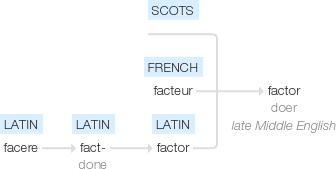Factor
late Middle English (meaning ‘doer’, also in the Scots sense ‘agent’): from French facteur or Latin factor, from fact- ‘done’, from the verb facere .
wiktionary
From Middle French facteur, from Latin factor(“a doer, maker, performer”), from factus(“done or made”), perfect passive participle of faciō(“do, make”).
etymonline
factor (n.)
early 15c., "commercial agent, deputy, one who buys or sells for another," from French facteur "agent, representative" (Old French factor, faitor "doer, author, creator"), from Latin factor "doer, maker, performer," in Medieval Latin, "agent," agent noun from past participle stem of facere "to do" (from PIE root *dhe- "to set, put"). In commerce, especially "a commission merchant." Mathematical sense ("The Quantities given to be multiplied one by the other are called Factors") is from 1670s. Sense of "circumstance producing a result" is attested by 1816, from the mathematical sense.
factor (v.)
1610s, "act as an agent, manage," from factor (n.). The use in mathematics is attested from 1837. Related: Factored; factoring.
